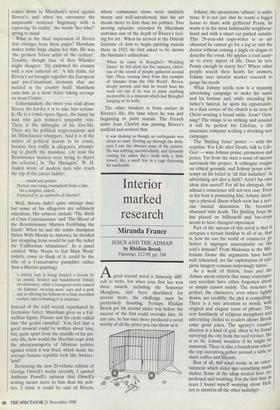Interior marked research
Miranda France
JESUS AND THE ADMAN by Rhidian Brook Flamingo, £12.99, pp. 194 Agood second novel is famously diffi- cult to write, but when your first has won three awards, including the Somerset Maugham, and been shortlisted for several more, the challenge must be particularly daunting. Perhaps Rhidian Brook got his second under way before the success of the first could overtake him. At any rate, he has once more produced a novel worthy of all the prizes you can throw at it. Johnny, the eponymous 'adman', is ambi- tious. It is not just that he wants a bigger house to share with girlfriend Penny, he wants it in the most fashionable neighbour- hood and with a smart car parked outside. This 29-year-old copy-writer is so ad- obsessed he cannot go for a jog or visit the doctor without coining a jingle or slogan to describe the event. He applies a cool analy- sis to every aspect of life. Does he love Penny enough to marry her? Where other people search their hearts for answers, Johnny uses interior market research to gauge his needs.
What Johnny needs now is a stunning advertising campaign to make his name and his fortune and, while attending his father's funeral, he spots his opportunity. In a dark corner of the church is an icon of Christ wearing a broad smile. Jesus? Grin- ning? The image is so striking and unusual it will be perfect for LifeGen, a life assurance company seeking a shocking new campaign.
The 'Smiling Jesus' poster — with the copyline 'For Life after Death, talk to Life- Gen' — wins Johnny praise, promotion and prizes. Yet from the start a sense of unease surrounds the project. A colleague resigns on ethical grounds, and Johnny pours con- tempt on his belief in 'all that malarkey'. Is advertising not also a faith? Aren't his own ideas also sacred? For all his chutzpah, the adman's conscience will not rest easy. Even as his boss is promoting him, Johnny devel- ops a physical illness which soon has a seri- ous mental dimension. He becomes obsessed with death. The Smiling Jesus he has placed on billboard and bus-stops seems to have changed expression. Part of the success of this novel is that it occupies a terrain familiar to all of us, that is, how far can the world of commerce go before it impinges unacceptably on the soul's domain? From Madonna to the Mil- lenium Dome the arguments have been well rehearsed, yet the exploitation of reli- gious imagery remains surprisingly taboo. As a work of fiction, Jesus and the Adman meets criteria that many contempo- rary novelists have either forgotten about or simply cannot satisfy. The structure is perfect, the characters, even where lightly drawn, are credible, the plot is compelling. There is a rare attention to words, with original and elegant turns of phrase. The very familiarity of religious metaphors and advertising clichés to readers allows Brook some good jokes. The agency's creative director is a kind of god, often to be found surveying the city from the roof rerrace. He is so fit, Johnny wonders if he might be immortal. There is also a boardroom where the top executives( gather around a table to share coffee and biscuits.
Best of all, the: novel works as an enter- tainment which slides into something much darker. Some of the ideas treated here are profound and troubling. For the first time 111 years I found myself worrying about Hell, not to mention all the other malarkey.


















































































 Previous page
Previous page